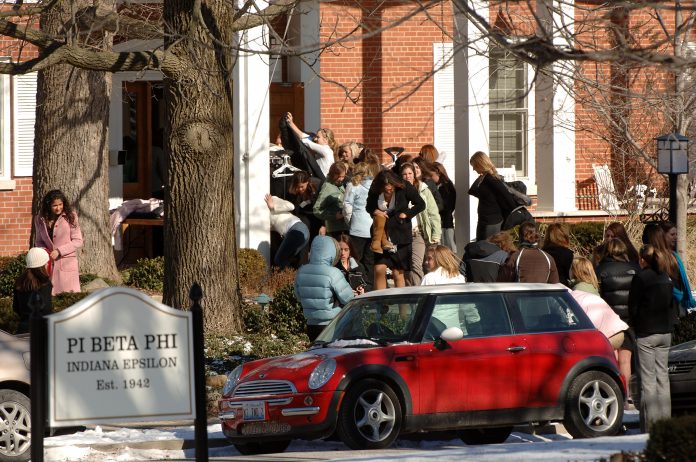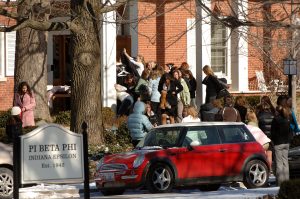

Change is coming to DePauw’s Greek community this spring, whether they like it or not.
On Aug. 19, Campus Living and Campus Development (CLCD) sent an email to all Greek leaders, which at the very end included the announcement of changing recruitment dates. Recruitment will now take place before the first week of the spring semester from Thursday, Jan. 26 to Sunday, Jan. 29. It previously took place the weekend after classes started.
The decision was ultimately made by Christopher Wells, former vice president of student life, who left DePauw this past summer to take a position at Colgate University. The main reason, cited by CLCD and Student Academic Life (SAL), for the change was complaints from faculty about recruitment negatively affecting students in the classroom.
Professor of biology and biochemistry, Sharon Crary, believes recruitment in the first week of the semester starts students off on a bad foot. “We often see students who are really struggling the first week back, often sleeping through class or a lot more absences,” said Crary. “Rush is so important for our students here, when that's foremost in their mind I think it's very hard for them to also be setting themselves up to be academically successful.”
Professor of economics, Gary Lemon, does not see recruitment affecting the majority of students, but has observed it having a dramatic impact on students who don’t get into the Greek organization they wanted. “It’s not a horrible distraction, but I see students who are upset,” Lemon said. “Most students can roll with the punches, but there are a few where this can be a fairly traumatic experience.”
President of DePauw’s Panhellenic Association, Grace Anshutz, acknowledged how some women going through the recruitment process skip class in order to prepare for the first round which previously took place in the afternoon right after classes.
President of the Interfraternity Council, Luke Hartline, also heard complaints from athletes and coaches. “A lot of winter sports teams felt that practices were not productive and rush was taking over too much of their time,” Hartline said.
The conflict between recruitment and faculty is nothing new, according to Lemon who has been a faculty member for the past 40 years. “There’s always been that tension between when we do recruitment because most faculty members think what goes on in their classroom is the most important thing and anything that distracts from that is an imposition,” said Lemon.
This is not the first time Greek recruitment will take place while classes are not in session. For a substantial period of DePauw’s history, recruitment was held during the summer before classes started. At the time, the University did not posses sufficient accommodations, making it necessary for first-year students to reside in Greek houses all year.
In 1989, after the construction of Humbert Hall allowed the University to accommodate more students, recruitment could be postponed until later in the school year.
While Greek leaders understand why the change was made, some are disappointed they weren't involved in the decision or alerted before the official announcement.
Anshutz did speak to CLCD members about potentially altering the process, but said the talks were vague. “Date changes were never a conversation,” Anshutz said. “I never expected those changes to happen in my term.”
Hartline also was a part of the informal talks, but these did not include changing the dates of recruitment. After hearing of the alterations, Hartline feels like his suggestions and comments at the talks were discarded by University officials. “It was kind of like ‘tell me what you think of this idea. Well turns out whatever your idea was doesn't really matter cause this is how it’s going to be,’” said Hartline.
Both Anshutz and Hartline say the school has done a poor job communicating about the change. Hartline stated that no school official has been willing to meet with IFC and explain the decision. Members of CLCD met with the presidents and recruitment chairs of all Panhellenic sororities the week after the decision was announced.
Anshutz believes if Greek leaders would have been involved in the change some of the growing pains could have been minimized.
The most recent change, holding recruitment between Winter term and second semester, has caused some anxiety for first-years going through the process. First-year, Emma Ardnt, withdrew from her winter term trip to Spain because she was worried she would not be back in time for recruitment. “It didn’t seem worth it to me because if I rush, you know all four years will be affected by that one thing, but I can make winter term up and go somewhere else for May term,” Ardnt said.
Ardnt withdrew and forfeited her deposit because she incorrectly thought her participating in the trip meant she wouldn't be back on campus for recruitment. “I didn’t get any information on it so when I did withdraw from my class I was under the assumption that if I was in a winter term I couldn't rush, and obviously there are other options, but nobody informed me of those,” Ardnt said. “I had to hear that as a rumor.”
According to the Hubbard Center, two winter terms, Sundance/Slamdance and Science and Research Development in India, might arrive after the first two rounds of recruitment on Jan. 28. While the Geology of New Zealand arrives earlier on Jan. 26, the day after first round, the students attending the trip triple the total of students missing recruitment, pushing it to 61 individuals.
According to the Hubbard Center, the dates for the India and New Zealand trip were a result of the long travel time, with the New Zealand trip taking over 48 hours and India around 24. In regards to the Sundance/Slamdance winter term, the Hubbard Center explained how the conflict was unavoidable because the Sundance celebration lasts the full length of winter term.
Anschutz, who has participated in multiple winter term trips, was disappointed first-years were opting out of trips in fear of missing recruitment. “I’m a little sad,” Anshutz said. “We encourage those people to take advantage of those education opportunities.”
With the announcement of the new dates, IFC and Panhellenic have yet to release an official schedule. Tentatively, Panhellenic Recruitment and IFC will begin on Friday, Jan. 27 with the first round, followed by second round on Saturday and third round on Sunday. Panhellenic will start Friday afternoon to give sororities extra time to prepare.
Student Academic Life has said they are allowing IFC and Panhellenic to create their own schedules for recruitment, as long as it takes place between the new dates.
Despite saying Greek leaders have the freedom to plan recruitment, IFC has already had a proposed schedule dismissed by CLCD.
The schedule proposed by IFC compounded the first round into one day, starting on Thursday Jan. 26 so recruitment could be completed by Saturday night. This would allow fraternities to have their bid nights on Saturday as they have had in the past. Bid night is the evening potential new members receive their acceptance bids into a Greek house.
The proposal, which would have solved one of students’ major qualms about the decision, was rejected by CLCD according to Hartline. “IFC has never shut down this idea, so it’s not coming from the IFC perspective. It's coming from the complete administration perspective,” said Hartline.
If men’s bid night is to take place on Sunday night, some students wonder if many fraternity men will attend the first day of classes. Bid night is often filled with brotherhood building events that last late into the night. “I definitely think Monday morning will be interesting to see who comes to class and who doesn't,” said Hartline.
He hopes fraternity men will attend classes, otherwise it may perpetuate negative stereotypes of Greek life. “To go to class on Monday is essential. If you don’t go to class it pretty much gives the faculty, the administration, anyone who looks at greek like in negative light, another excuse to target greek life and say it's more detrimental to this campus than beneficial.”
Alternative recruitment was previously offered at other times during the week leading up to formal recruitment for students who had scheduling conflicts with formal rounds. Greek leaders are currently searching for new alternative recruitment dates to fit with the change in schedule.
Although not finalized, IFC is currently considering scheduling alternative recruitment for the first week of the second semester. This timing presents its own issues because potential new members would already know each house's pledge class before making their decision. “I would hope that the alternative rush experience wouldn't be picking your pledge class, but picking the house you want to be in,” Hartline said. The dates would also mean anyone going through the alternative recruitment process would miss bid night.
While alternative recruitment offers students the ability to join a Greek house if they can’t attend the regular process, some students have no interest in it. “Considering all my friends want to rush and I want to rush with them, and it’s kinda like a thing we want to do together as friends. If I were to be the only person that didn’t go through it with them it would bother me a lot and I'd feel left out and I feel like I wouldn’t have the same opportunities that I would if I was with my group of friends,” said Ardnt.
IFC and Panhellenic plan to release official recruitment schedules in the coming weeks.
**Clarification: The story previously stated," It previously took place the weekend before classes started for the second semester." It should read as,"It previously took place the weekend after classes started."
